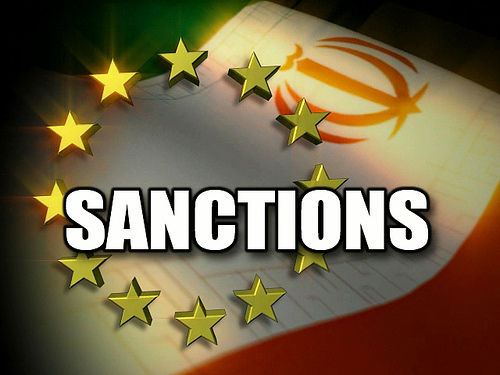
America’s regime of sanctions on Iran are ineffective but we’re likely to see more of them. That’s the conclusion of a panel of experts assessing the state of US-Iran relations at an event rolling out a comprehensive compendium of policies, laws, and regulations pertaining to Iran.
Kenneth Katzman, the compendium’s lead author and an Iran expert for the Congressional Research Service says that "Congress will work to find every which way to squeeze Iran" and that he had already had fifteen inquiries from Members that day on the matter of additional sanctions.
But CAP’s Flynn Leverett says that such measures were merely "a policy of feeling good" that are having no beneficial impact on Iran’s policy-makers but are harming America’s interests in the world, most notably by giving China more leverage.
None of this is news to anyone who’s been paying any attention at all. Sanctions almost never work, since the ruling class is the last to feel the pain and there are always state and non-state actors willing to circumvent the sanctions regime for a price. As a general rule, sanctions make those enacting them feel like they’re doing something but wind up hurting the very people we’re ostensibly trying to help, the ordinary citizens suffering under repressive regimes.
What’s less widely understood, as Damon Wilson, the Atlantic Council vice president and International Security Program director, noted in introducing the panel, is how incredibly hard sanctions are to undo. Years after we toppled Saddam Hussein and replaced his regime with one friendlier to the United States, a myriad of sanctions remain in place.
As Katzman explained in his talk, some sanctions fade easily. He gave the example of those that come with being listed as a state sponsor of terrorism by the State Department. The president can simply take a country off the list if its government changes. Otherwise, as was the case after Libya agreed to abandon its WMD pursuit, the president can order the removal pending a 45 day response period. Conversely, sanctions put on by the Congress or the United Nations can take years to untangle.
Additionally, overlapping sanctions produced over time tend to be enormously confusing. As Katzman notes, there has been no clear, sustained consensus on how to deal with Iran. We alternate between carrots and sticks, freezes and thaws, openness and hostility. But laws and policies promulgated at these various junctures often remain on the books. Further, international and domestic sanctions are frequently at odds.
With rare exception, then, sanctions regimes are ineffective, unwieldy, blunt, and unresponsive to rapid changes in real world conditions. But, because of a lack of better apparent options and a pressure to "do something,"we’re likely to see an increase in their use.
James Joyner is managing editor of the Atlantic Council.
Image: iran-sanctions_0.jpg
